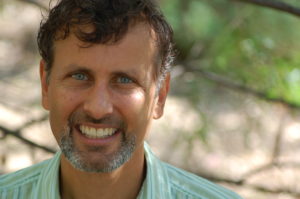 This post is part of our Journey Forward series. We’ve invited folks from across Mennonite Church USA to reflect on our Journey Forward and consider how they’ve seen Renewed Commitments at work in their lives, their congregation or community. If you’d like to contribute to this series by highlighting stories that bring our shared values to life, email JenniferC@MennoniteUSA.org.
This post is part of our Journey Forward series. We’ve invited folks from across Mennonite Church USA to reflect on our Journey Forward and consider how they’ve seen Renewed Commitments at work in their lives, their congregation or community. If you’d like to contribute to this series by highlighting stories that bring our shared values to life, email JenniferC@MennoniteUSA.org.
Rob Muthiah is a professor of practical theology at Azusa Pacific Seminery. He is the author of a number of books, most recently The Sabbath Experiment: Spiritual Formation for Living in a Non-Stop World. He and his family are members of Pasadena Mennonite Church, where they have worshiped since 2001. In his free time he enjoys gardening, getting out into the local mountains and fly fishing.
Last spring, our church held a baptism service at the beach. Here in California, beach baptisms are not a rare occurrence, but this was a first-time experience for me. Novelty aside, what made this baptism especially significant for me was that Aaron, the high schooler I’ve been assigned to as a mentor for the last several years, was getting baptized.
I was led to reflect on Aaron’s baptism as I noticed how baptism is situated in MC USA’s Renewed Commitments document. In describing what it means to follow Jesus, the document states that “Through baptism we commit ourselves to live faithfully as Jesus’ disciples, no matter the cost.” Our Anabaptist forebears understood clearly the cost that might come with baptism — many of them were killed for being baptized as consenting adults. I’m glad Aaron is unlikely to have to pay that sort of cost for being baptized, but baptism is still something not to be entered into lightly.
Aaron and his family came to our church when he was in early elementary school, so he has basically grown up in our church. His parents are faithful, fun-loving people whose energy for serving others is incredible. Aaron grew up going to Sunday school and then going to youth group once he hit middle school age. That’s also the point where he had the option of asking for a mentor to be assigned to him, and I had the honor of being approached to serve in this role. The expectation of the program is that we do something together at least once a month. Aaron and I spend most of our time together (outside of Sunday conversations) either on our bikes in the local mountains or sitting and chatting at Jamba Juice. This time has included a couple conversations about baptism.
Before Aaron was baptized, he went through a baptism class, but much more important than that class was the way Aaron had been prepared for this moment by years of training: by the way his parents have nurtured him, by his years of formation as part of our church community, and by the influence of three years connected to a mentor. In these ways, Aaron was well-catechized for baptism, though it looked a little different than the early church’s formal three-year baptismal catechism. Aaron could articulate some of what he was committing to, but he also knew viscerally what he was committing to because he was surrounded by a community of Christians trying to live into their baptismal vows.
 One aspect of baptism for Aaron was making a public statement of his commitment to follow Jesus and his commitment to doing so with the community. What a blessing it was for the community to hear this young man state why he wanted to be baptized! But in my understanding of baptism, there’s more.
One aspect of baptism for Aaron was making a public statement of his commitment to follow Jesus and his commitment to doing so with the community. What a blessing it was for the community to hear this young man state why he wanted to be baptized! But in my understanding of baptism, there’s more.
In baptism, we are born into a new family.
When Aaron came out of the baptismal waters, he was delivered to multiple parents, aunties, uncles, and cousins. Scripture uses birth imagery to describe those who can see the kingdom of God (John 3:3-7) and tells us that those who follow Jesus constitute a new family (Mark 3:34-35). So now Aaron has a new family identity that binds us all together in our responsibilities and commitments. Baptism locates his faith commitment to God within the context of the family of God, and that’s an amazing place to live, serve and grow in the Lord.
Baptism is also about a new identity. It involves dying to the old self by going under the water and coming out of the water birthed into newness of life — a new identity.
We all have overlapping identities, some of which play well together and some of which exist in tension. Baptism stakes out an identity for us as Christ-followers that is more central and more fundamental than all other identities.
It may incorporate some of our other identities and it may reject others. This new identity confronts the ways in which identities connected to national origin, race, class and gender pit us against one another. Aaron might not yet know how baptism has made this claim on his life, but by the grace of God, he’ll learn.
This reminds me of the importance of re-visiting our baptismal vows. One of the things I love about welcoming new members into our congregation is that our membership liturgy includes a part where we who are current members are asked to renew our own baptismal vows, as we did a couple weeks ago when Ann became a member. It reminds me that though we are baptized once, we spend our whole lives seeking to live into that baptism.
Baptism is a big deal — for Aaron, for me and for our community. When I see the way baptism is included in the Renewed Commitments document, my mind thinks about how this practice has shaped our Mennonite tradition historically, and my heart responds in joy and thanksgiving for the ways baptism continues to form us into God’s people today.
___________________________________________________________________
All congregations are invited to use Journey Forward’s “Pathways” study guide. Find it and all Journey Forward updates here.
Your financial support of MC USA helps us equip leaders and tell stories of Anabaptist faith in action across the church. Donate to MC USA here.

